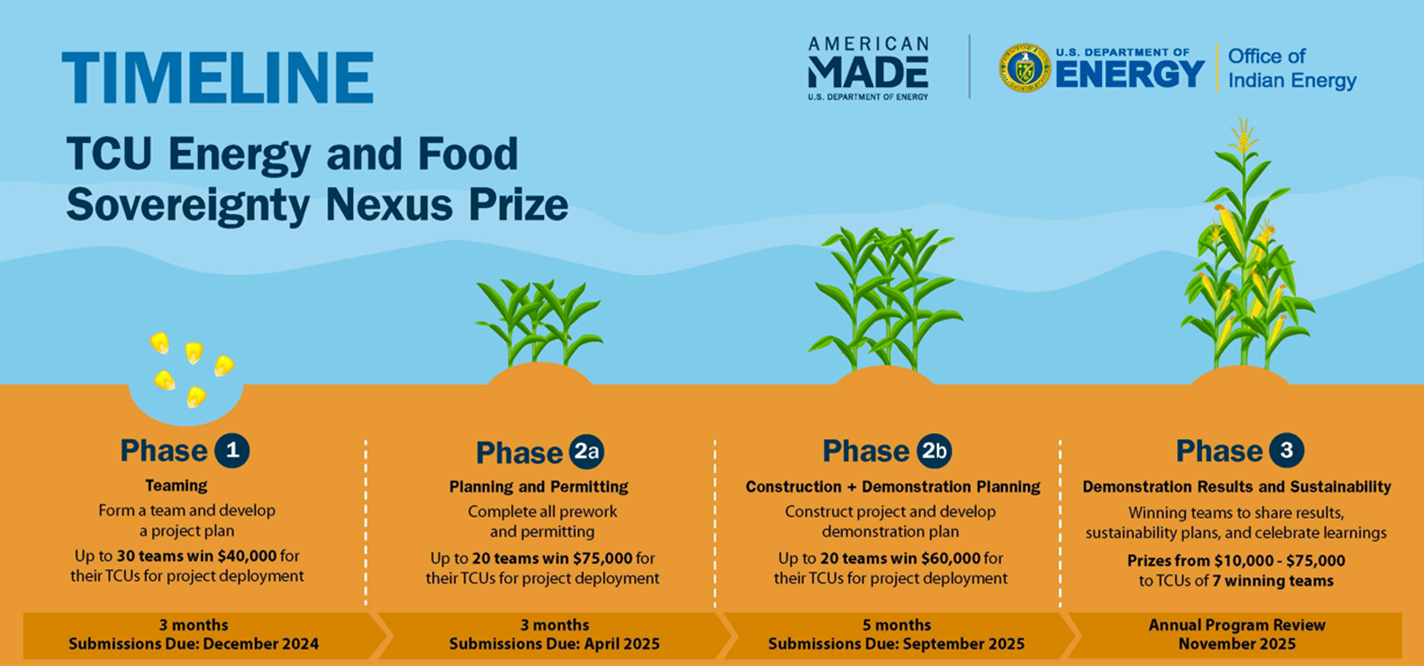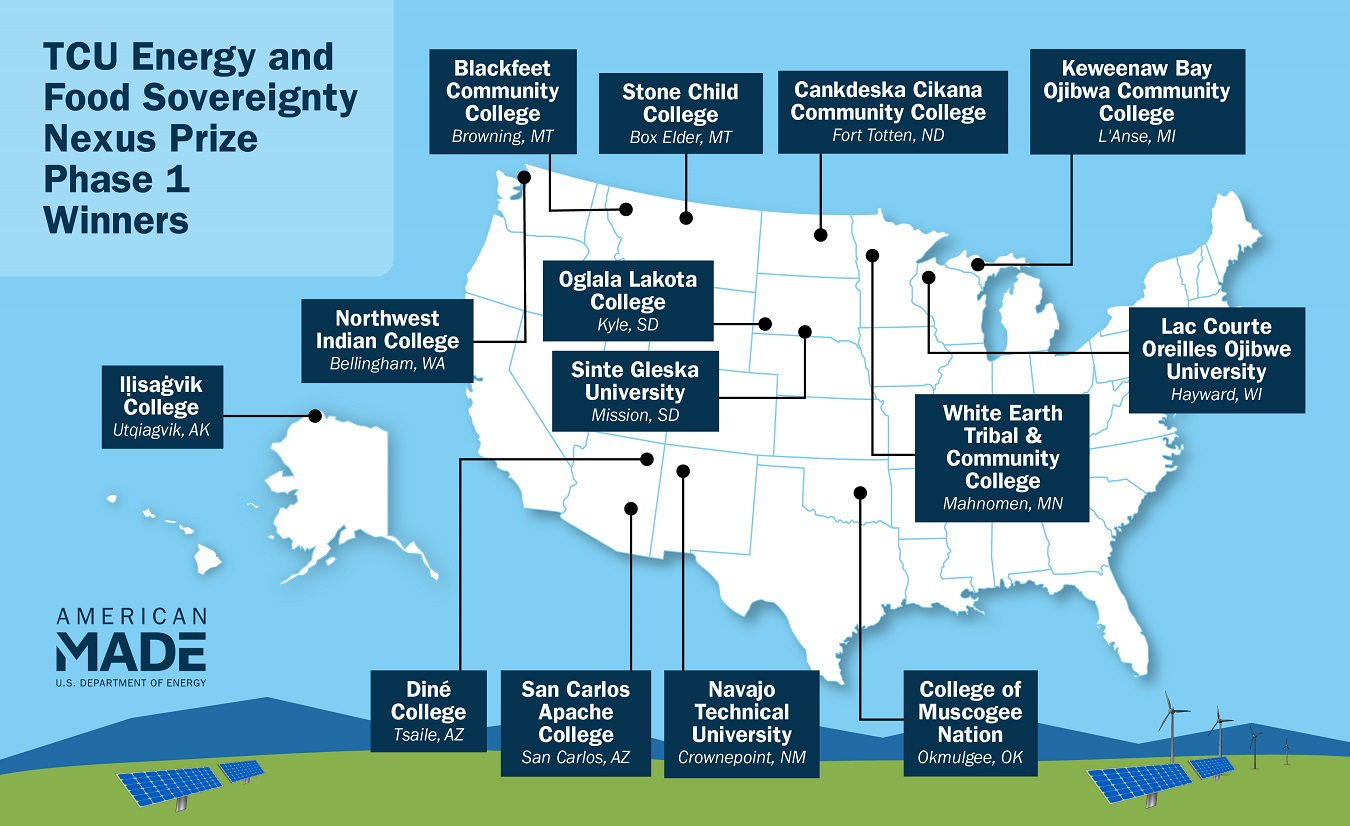Student-Led Teams Developed Plans to Increase Food Sovereignty Using Renewable Energy
Office of Indian Energy Policy and Programs
January 8, 2025WASHINGTON, D.C.—The U.S. Department of Energy (DOE) Office of Indian Energy Policy and Programs (Office of Indian Energy) today announced 14 Phase 1 winners of the American-Made Tribal College and University (TCU) Energy and Food Sovereignty Nexus Prize. Student-led groups teamed up and created plans to increase the use of renewable energy to support Tribal food sovereignty initiatives on TCU campuses.
“TCU’s hold unique ties to land, language, and Indigenous knowledge to foster a regenerative economy,” said Office of Indian Energy Director Wahleah Johns. “The $4 million prize selections will support 14 student led teams in demonstrating how clean energy compliments and strengthens Indigenous food sovereignty.”
Meet the Phase 1 Winners
| Tribal College and University | Submission Name | Location |
| Blackfeet Community College | SAPOO Land Energy | Browning, MT |
| Cankdeska Cikana Community College | EverGreen: All Seasons Sustainable Agriculture | Fort Totten, ND |
| College of Muscogee Nation | Ekvnv Hoporenkv: Clean Energy for Food Sovereignty | Okmulgee, OK |
| Diné College | K'é (Kinship) in Agriculture | Tsaile, AZ |
| Iḷisaġvik College | Growing Sovereignty: An Arctic Sun & Solar Project | Utqiagvik, AK |
| Keweenaw Bay Ojibwa Community College | KBOCC Food Sovereignty & Sustainability Group | L'Anse, MI |
| Lac Courte Oreilles Ojibwe University | Waasamoowinikeng ‘Making Electricity’ | Hayward, WI |
| Navajo Technical University | Food Sovereignty & Energy Nexus on Navajo Land | Crownepoint, NM |
| Northwest Indian College | Integrating Indigenous Science with Agrivoltaics | Bellingham, WA |
| Oglala Lakota College | Lakota Sustainability Initiative | Kyle, SD |
| San Carlos Apache College | Agriculture and Energy | San Carlos, AZ |
| Sinte Gleska University | White Feather Tail Woman Garden & Solar Greenhouse | Mission, SD |
| Stone Child College | SCC Sustainability in Institution and Community | Box Elder, MT |
| White Earth Tribal & Community College | WETCC NEXUS VAWT PROJECT | Mahnomen, MN |
What’s Next for Competitors
Phase 1 winners were chosen for successfully forming teams and developing project plans. Project plans consisted of (but were not limited to) building greenhouses powered by wind, solar, or geothermal energy, and constructing solar arrays that provide shade for crops to grow. TCUs of Phase 1 winning teams were each awarded a $40,000 cash prize and will advance to Phase 2a.
In Phase 2a, teams will compete to win a $75,000 cash prize for their TCU, completing all the necessary prework and permitting for their project. All Phase 2a winners will continue to Phase 2b in which they will construct their projects and develop demonstration plans, with an additional $60,000 cash prize available for each TCU.
In Phase 3, all teams will gather to share learnings and winning teams will be awarded up to a $75,000 cash prize.

Read more about the prize and semifinalists at https://www.herox.com/TCUenergyandfood.
This is the Office of Indian Energy’s first prize in the American-Made program, which incentivizes innovation through prizes, training, teaming, and mentoring by connecting the nation’s entrepreneurs and innovators to America’s national labs and the private sector.
Learn More About Office of Indian Energy Investments
DOE funds a wide variety of projects to support Tribes in realizing their energy visions. From 2010 through 2024, DOE's Office of Indian Energy has invested over $190 million in more than 240 Tribal energy projects implemented across the contiguous 48 states and in Alaska. These projects, valued collectively at over $300 million, are leveraged by more than $125 million in recipient cost-share. Find information about current funding opportunities and learn more on the DOE Office of Indian Energy website.


